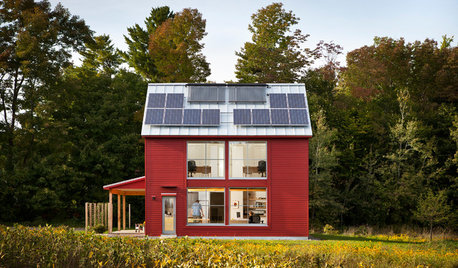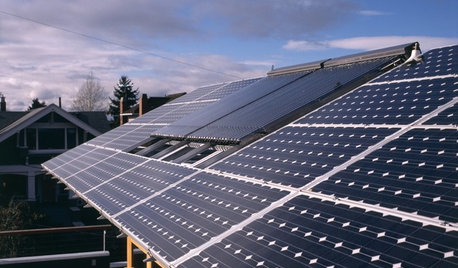Cost of solar batteries?
chuckr30
18 years ago
Related Stories

GREEN BUILDINGGoing Solar at Home: Solar Panel Basics
Save money on electricity and reduce your carbon footprint by installing photovoltaic panels. This guide will help you get started
Full Story
LIGHTINGHow to Choose the Right Solar Lights
Learn about different types of outdoor solar lights, where to use them and why you might want to avoid the bargain bin
Full Story
HOME TECHSmall Solar: Big Home Tech Trend in the Making
New technology enables everyday household objects to power themselves by harnessing natural light
Full Story
GREEN BUILDINGLet’s Clear Up Some Confusion About Solar Panels
Different panel types do different things. If you want solar energy for your home, get the basics here first
Full Story
GREEN BUILDINGSunlight Used Right: Modern Home Designs That Harness Solar Power
Embracing passive heating principles through their architecture, siting and more, these homes save energy without skimping on warmth
Full Story
DECORATING GUIDESGadget Watch: What's New for the High-Tech Home
A heater fan, robotic vacuum, solar-powered iPhone charger and other hot home gadgets
Full Story
HOUZZ TOURSHouzz Tour: Off the Grid in the Remote Washington Wilderness
Not only does this house run on solar power, but it was built with it too
Full Story
GREEN BUILDINGOff the Grid: Ready to Pull the Plug on City Power?
What to consider if you want to stop relying on public utilities — or just have a more energy-efficient home
Full Story
LIFEHow to Prepare for and Live With a Power Outage
When electricity loss puts food, water and heat in jeopardy, don't be in the dark about how to stay as safe and comfortable as possible
Full Story
OUTDOOR PROJECTSBring In the Birds With a Homemade Bubble Rock
An avian expert from Southern Indiana shows how to make a burbling fountain that migrating birds will love
Full StorySponsored






mgmsrk
RCMJr
Related Professionals
Emeryville Solar Energy Systems · North Tustin Solar Energy Systems · Pinellas Park Solar Energy Systems · Oak Grove Design-Build Firms · Clarksburg Home Builders · Fresno Home Builders · Seguin Home Builders · Seymour Home Builders · Westmont Home Builders · Westwood Home Builders · Elgin Roofing & Gutters · Phoenix Roofing & Gutters · North Hollywood Roofing & Gutters · Sauk Village Roofing & Gutters · Weston Roofing & Guttersherb_wi
foolyap
RCMJr
foolyap
joyfulguy
RCMJr